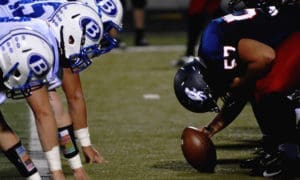 Vince Lombardi loved to talk about the concept of the second effort. In fact, it’s the basis of a short sales training movie created in 1968 that is still showed to sales teams in training programs today. Lombardi is famous for showing his players football clips of receivers who almost caught the ball but let it slip through their fingers. Then he’d show clips of players who made the second effort; same situation, but when they realized the ball was slipping through their fingers, they dove and caught the ball just before it hit the ground. Other clips were of running backs who were almost crushed but managed to somehow wiggle free and made the touchdown.
Vince Lombardi loved to talk about the concept of the second effort. In fact, it’s the basis of a short sales training movie created in 1968 that is still showed to sales teams in training programs today. Lombardi is famous for showing his players football clips of receivers who almost caught the ball but let it slip through their fingers. Then he’d show clips of players who made the second effort; same situation, but when they realized the ball was slipping through their fingers, they dove and caught the ball just before it hit the ground. Other clips were of running backs who were almost crushed but managed to somehow wiggle free and made the touchdown.
His point in showing these clips was to point out that everyone makes the first effort. To even get on his team you had to do that; but so did all the other players on the opposing teams—and those standing by waiting for an opening to get on the team can do that. But if you want to be great, you have to go beyond that. He knew the difference between the good players and the great ones is that the great ones always make the second effort despite their first failure or setback. Just doing everything the coach expects of you is not good enough for the great players—and that CAN already be a lot. They are compelled to go beyond that every time, and THAT is why they succeed.
In business, the fact that you’ve decided to cobble together some type of services offering and go into the marketplace and ask for a check shows you’ve made the first effort. But remember this: your competition is able to do that. Hiring, managing, bookkeeping, marketing, selling, and customer service are bare minimums of running a business. You HAVE to be at least average at these things in order to survive. And for many, those FIRST efforts are just about all they can handle, which is why they struggle to get ahead.
It isn’t enough to simply provide “good” service to your clients and fix their computer problems. Any other IT service provider in the country can do that. That’s EXPECTED of you. If you really want to have loyal, happy clients who refer in abundance, you have to take the time to truly service that account to the point of knocking their socks off. If you’re in sales, making phone calls, following up with prospects, answering questions, and asking for the order are BASICS. Everyone is capable of doing that. But how many of you are taking the first “no” without making a second attempt?
The key to winning more accounts
As many of you know, I’m in the middle of revamping the Million-Dollar Managed Services Blueprint (more on this at www.managedservicesblueprint.com/live). One of the biggest reasons folks join is because they are looking for a marketing campaign or strategy that will convert break-fix clients to a managed services contract. Naturally, strategies for this are included; but that aside, the key to winning over these accounts is the second effort.
 In most cases, these MSPs approached their break-fix clients and “talked” to them about managed services but were turned down. That’s the first effort.
In most cases, these MSPs approached their break-fix clients and “talked” to them about managed services but were turned down. That’s the first effort.
What’s REALLY rare is to see an MSP going back to that client a second, third, or fourth time either at the point of the client saying “no” or a few months later and asking them to revisit their proposal. You don’t need a fancy campaign to do this. You could simply visit the client or call them on the phone and say:
“Hey Bob, would you mind if we took one more look at that managed services plan I showed you? I feel you might be overlooking the preventative maintenance factor that I believe will save you from a lot of problems and unexpected IT costs in the long run. Yes, you will be paying us a bit more every month, but it’s an even better deal for you when you consider how it will make everything run faster, unburden you and your staff from dealing with the computer problems you’re dealing with now, and the fact that we’ll help you avoid some pretty hairy problems like lost or corrupt data, hacker attacks, viruses, and the like. I really feel very strongly about this and think it’s the right thing for you to do.”
How to hire a team that makes the second effort
My friend Garrett Gunderson, author of Killing Sacred Cows, recently shared a hiring strategy he uses that instantly separates the ones that will make the “second effort” from those what won’t. During the interview he asks them, “In order to hit your targets, are you willing to do your very best or whatever it takes?” Those that say they’ll do their best get eliminated immediately. Those folks are the ones who excuse their failure by saying they “did their best.”
Chet Holmes uses a similar strategy when hiring top sales people. In the initial phone interview (regardless of their past performance and results listed on their resume), he’ll say, “You know, Mary, in the help wanted ad we stated very clearly that we were only looking for top performers … and I have to be honest with you … I’m just not seeing anything here that shows you are a top performer.” Those sales people who consistently make the second effort and who won’t stop at the first “no” will instantly start overcoming that objection. If they don’t at least make the effort, he eliminates them as a candidate.
Here’s something you can share with your staff
If you are a technician, doing what your boss expects of you is the first effort. That’s what you get paid for. But if all you are going to do is the bare minimum of what’s expected, you’ll never get ahead professionally. There are thousands of computer technicians who can fix PCs, show up to work, and do what’s expected of them. There’s no award for that, and you don’t deserve any special recognition for doing what’s right. If you truly want to shine, you have to LOOK for ways to make that second effort. Maybe that’s hanging in there with an unhappy client a few minutes longer or making a follow-up call to make sure a client received the result they wanted. Maybe it’s being militant about entering your time accurately and making sure you are utilized 75 percent of the time or more. It’s also about looking for hidden sales opportunities with clients or taking training classes to help you do your job better and faster on your own time.
If you are a secretary, you are often the first impression a prospect has with the company. It’s not enough for you to simply do your job; there are hundreds of people in the marketplace right now who are willing to do that. Maybe that requires you going the extra mile to follow up with a customer. Maybe it’s looking for ways to save the company money or organize a process better so there are fewer dropped balls. Maybe it’s picking up a new responsibility without being asked because you see the need. Maybe it’s making sure the phones are answered live until 5:15 p.m. not until 4:58 p.m. And it’s doing it without your boss making it a requirement or checking over you to make sure it’s being done. Make the second effort.
